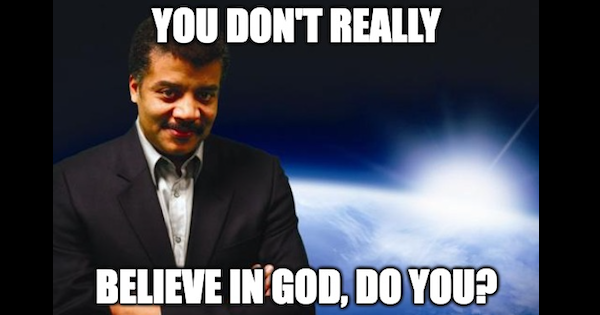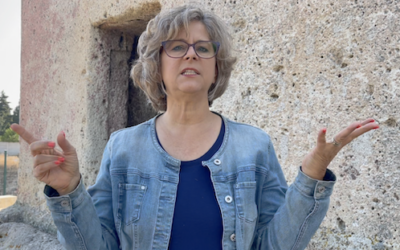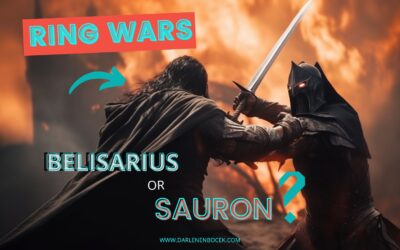1. The Accusation
2. The “Self-evident” Premises
3. The Y factor
4. Objectively Verifiable Truths
The accusation
Neil deGrasse Tyson: It is not good for earthquakes to happen. It proves that there is no “good” God who made this system.
Facts: Lisbon, Portugal. Date 1755. An earthquake happens on All Saints Day. 80,000 people die in church. MORE INFO
Six premises, all tied up into one conclusion:
PREMISE
A: Good is defined as interested in mankind’s health and longevity.
B. Either God is not all powerful or God is not all good.
C: A powerful God could have kept the earthquake from happening.
D: It is not good for people to die in church.
E. A good God would have wanted an earthquake to not happen.
F: The earthquake was not stopped and people died in a church.
Written in simplified logic form this would be:
I.
- If x is q, then p is q and if x is ~q then p is ~q.
- Either p is q or p is ~q
- q is r
- therefore either p is r or p is ~r
II.
- Either p is r or p is ~r
- ~r is ~q
- therefore either p is r or p is ~q
III.
- Either p is r or p is ~q
- r is ~s
- therefore either p is ~s or p is ~q
IV.
- Either p is ~s or p is ~q
- Not ~s, therefore s
- Therefore p is ~q
- Therefore x is ~q
x-God
p-God’s will
q-to be good
r-to be concerned about health and life of man
s- an earthquake happening
I.So with the premises filled in, it looks like this:
- If God is good, his will is good and if God is not good, his will is not good.
- Either God’s will is good, or God’s will is not good.
- It is good to be concerned about health and life of man
- Therefore either God’s will is to be concerned about health and life of man, or Gods will is not to be concerned about the health and life of man.
II.
- Either God’s will is to be concerned about health and life of man, or God’s will is not to be concerned about the health and life of man.
- To be not concerned about health and life of man is not good.
- Therefore either God’s will is to be concerned about health and life of man, or God’s will is not good.
III.
- Either God’s will is to be concerned about health and life of man, or God is not good.
- To be concerned about health and life of man means there will be no earthquake.
- Therefore God’s will is that there will be no earthquake, or God’s will is not good.
IV.
- Either God’s will is that there will be no earthquake, or God is not good.
- It is not the case that there was not an earthquake and there was an earthquake.
- Therefore God’s will is not good.
- Therefore God is not good.
CONCLUSION
Therefore, there is no all-powerful, all-good God.
The “Self-evident” Premises
- q is r
- ~r is ~q
- r is ~s
These were never proven. Let us look at them briefly.
p-God’s will // q-to be good // r-to be concerned about health and life of man // s- an earthquake happening
- To be good means to be concerned about health and life of man.
- To be not concerned about health and life of man is not good.
- To be concerned about health and life of man requires an earthquake not happening.
Is it true, though?
If God’s goodness requires his only consideration to be the health and life of man, that would require him to pause every other consideration to enable man to continue in the way he is going. To be an “air bag” so to speak, or a slave to the cause of mankind’s health and life. Is that true? Must there be a being whose only definition is the welfare of man? No.
Of course we’d like him to be only concerned about that, but maybe his consideration for man is higher and greater than just health and life that can be stopped with an earthquake. If there is some greater truth to consider, say perhaps a bigger benefit for man, then he would be ‘required’ by that same goodness to not stop the earthquake.
So our new self-evident premise would have to be
y-a bigger concern is good
q is r unless y is q
If we put that into the equation, the conclusion would be:
- Therefore p is ~q unless y is q
- Therefore x is ~q unless y is q
Without taking into consideration what “y” could be, we might be led to the conclusion Neil deGrasse Tyson comes to. But what could the “y” be?
Can we make a self-evident premise that says ~y? That he “has no bigger concern.” We cannot. If God is that Being we are considering, all-powerful, all-knowing, all-good.
We can only either suppose he must conform to our human-centered view of what his goodness requires, or delve into that y.
My Response
The Bible does claim, in God’s words,
“I do not take pleasure in the death of the wicked, but that they would turn from their ways and live.” Ezekiel 33:11
Even if those in church were “wicked,” it would not have pleased God for them to die.
So how could something happen that does not please God? Because of the “y-factor.”
The Y Factor:
Y is a BROKEN SYSTEM That is Being Fixed.
The only way to reconcile this is to see that something that is Good was broken, and goodness requires that the method of fixing it does not save those people from the earthquake.
The world strikes us as a place that SHOULD be good. The fact that we want good (no death, no earthquakes, no tsunamis, no disease) tells us that it fits the system for things to move in a positive way.
If something is broken, we would hope it would be the duty of an all-powerful, all-good God to fix it.
Complicating factor: He is also all-just, and put in us an alarm that stuns us when we cross the line. Namely, conscience.
God did do something to fix it, namely send Christ and a way for us to enter into a new and fixed system. Through death. I think that welcoming his faithful, who will die anyway, into a new system that is wholly GOOD is much better than letting them stay in a broken, sad, heartbreaking system.
Especially if those people are already aware of his ‘secret passage’ to this new dimension, namely through the bond of faith in Christ.
Objectively Verifiable Truths
Neil deGrasse Tyson says,
“Objectively verifiable truths are needed.”
Which is only difficult for us because we no longer have the sample available to prove the claims of research done in the past. But we have four verified research reports by four different researchers finding the same conclusion regarding the sample. We had skeptics test the hypothesis and change their theories after testing.
The problem is, the sample is no longer available for direct test. If it were, perhaps DNA testing and video recording would have been used to verify what eye-witnesses attested to.
What we do not have is counter-examples, or proofs from the time against the test. Certainly there were people who did not like the conclusions. And yet the only writer/researcher who attempted to stop the theory, converted to the theory himself.
How can we test?
There are four dimensions in this five-sense testable world
- Height
- Depth
- Width
- Time
There are also several other dimensions that I am aware of, which we sense without our eyes and ears, without this four dimensional world.
- The world of mind. (calculates, figures, reasons)
- The world of passion. (feels, hates, loves)
- The world of dreams. (imagines while I’m awake and asleep)
- The world of soul. (senses the holy, feels guilt, understands contact with the Creator)
- The world of memory. (recalls in often vivid detail the moments I have lived)
- The world of angels and demons. (often it can be breached, especially by those who call upon it)
- The world of heaven. (I am aware that those who have died have moved on, a dimension NDE’ers speak of)
Today we can test the validity of the sample (Jesus of Nazareth), from the evidence we have before us, as historians. If we objectively approach the testimony of Dr Luke, Matthew, Mark and John we find that something happened that changed their lives. And they wrote down what happened to them.
What does it mean to be OBJECTIVE?
Objective. adj. (of a person or their judgment) not influenced by personal feelings or opinions in considering and representing facts: “Historians try to be objective and impartial.” • not dependent on the mind for existence; actual (Apple Dictionary).
NO ONE can be objective about anything they observed. The fact that the ‘gospel writers’ are not objective, but that their testimonies corroborate as to the miracles and claims and resurrection of Jesus of Nazareth, speaks into the dynamic experience they had.
Denying the testimony of these eye-witnesses, because we do not like what they say, would be like some leader denying that anything happened to the Armenian Orthodox people of Turkey in the early 1900, because he does not like what they say. Something happened, in both cases, and the non-objective testimony of eye-witnesses speaks loudly.
It was hard to believe, during WWII, that such a thing as a place like Auschwitz could exist. People who heard, immediately denied it could be true. But history has shown that things that go against reason have in fact happened. For their own reasons.
Dr. Tyson is correct in saying that there is an aspect of this that leans on evidence not visible equally to everyone. This awareness is not attained through speculation, logic, and reason. As in the quantum-world, things are not universally observed. Unfortunately for some, this plain-view “Atlantis” is hidden from eyes of some.
2 Kings 6:17 Then Elisha prayed and said, “O LORD, please open his eyes that he may see.” So the LORD opened the eyes of the young man, and he saw, and behold, the mountain was full of horses and chariots of fire all around Elisha.
Novel Connection
In Trunk of Scrolls, the problem of suffering is delved into as Christians face the God of the Earthquake, asking the same questions Dr. Neil deGrasse Tyson asked, of how a good God could allow evil to happen to his followers.




